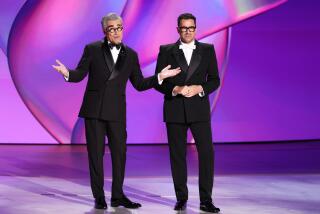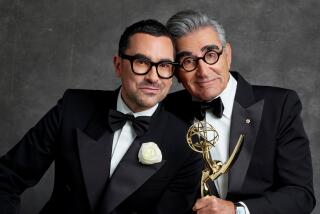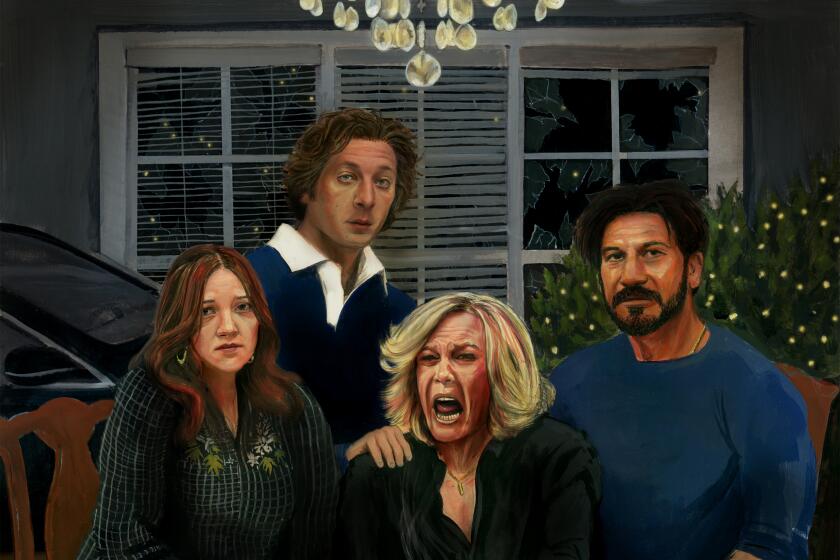Emmy Round Table: From bingeing to unpleasant characters to Sharpie fumes, dramatic actors tell all
Remember when you got scolded for watching more than an hour of TV at a time? Or when “bingeing” was followed by a hangover? Those days are long gone, as the guests on The Envelope’s annual Emmy Drama Roundtable made clear in a recent conversation.
Gathering to chat were Alan Cumming, chief aide to the governor on CBS’ “The Good Wife”; Taraji P. Henson, the jailbird hip-hop producer on the Fox hit “Empire”; Felicity Huffman, the grief-stricken mother on ABC’s “American Crime”; Michael Sheen, the cold researcher on Showtime’s “Masters of Sex” and Sissy Spacek, the matriarch of a troubled clan on Netflix’s “Bloodline.”
Beyond the art of the binge, the group had a spirited conversation covering moral ambivalence on television (it’s a good thing), acting for cellphone viewing (a bad thing) and the art of touching your co-workers.
Below are edited excerpts from that April conversation.
So, what do you find fascinating about the current state of TV? Is it the way people are watching, like on any type of device? Is it the amount of time they’re willing to spend watching over the weekend — they’ll sit 12 hours sometimes? Or is it the way that they’re engaging on social media? What do you find interesting right now?
Alan Cumming: I think the word “binge” coming into our lexicon is a really great thing. People say on the street, “I binge-watched you last night!” And it’s sort of a weird new verb. I like that. But I’m most excited about the fact that there are so many options and so many channels and so many ways to stream and see things that when people are passionate about something, they really let you know because you might not have heard of it.
Taraji Henson: And social media because that’s where I find a lot of shows. You know, I’d heard of “House of Cards,” of course, but then when I saw people talking about it on my timeline it made me go, “Whoa, what’s this?” and then I watched it and I was hooked.
Did you binge watch?
Henson: I did. That’s actually the only way I can watch television because I never have time to sit down and catch an episode of anything. So it’s a great way to catch up and not have to wait through the agony of, “What’s going to happen next?” You can just watch the entire series in one sitting with a bottle of wine.
Michael Sheen: But we start to lose our ability to put off short-term gratification. The idea of waiting another week to watch a show, I’ve always hated that, but maybe it’s good to hate that. Now you can just plow through. I mean, I love it. I’m the same as you, I just want to keep going with something but I wonder what that’s doing to us internally now.
Knowing people are sitting down with it and sometimes watching five or six episodes — and sometimes they’re watching on a phone — does it change the way you’re taking on the character? Do you feel like you need to be more subtle with some of your choices, knowing people are going to be with it for a much longer time?
Felicity Huffman: I try and do very tiny, tiny gestures because if I’m on a tiny phone…
[laughter]
Sissy Spacek: I never even thought of that.
Cumming: I think subtlety’s an overrated — yeah, I’ve never thought—
Spacek: Now I’m going to worry.
Henson: Now I’m all confused.
Spacek: Or actually when you know people are going to watch it on their phones you do everything real big.
[laughter]
Sheen: Talking about social media, Taraji, with your show, it seems to me from the outside that part of the excitement for people is kind of just the reaction to what happened, “Oh, my god, what’s going to [happen next]?” And so having the gap [between episodes] is really important in a way for social media people to exchange their ideas about it and get really excited about it. Whereas if everyone just watched it all in one go, they wouldn’t have that opportunity.
Henson: Well, if it’s appointment TV, if you have to sit down and catch it, well, then the thing is that if you are heavily involved in social media then it becomes, “Oh, I don’t want to miss it. I don’t want any spoilers.” So you have to sit down and watch it and then it’s like, “OK, I can join in on the conversation or the Twitterverse,” you know? Yeah, social media has definitely changed the game.
Cumming: Oh, and it’s a terrible thing I think to say to an actor, “Would you please, whilst people are watching you in this episode, distract their attention by [tweeting] inane comments about what you did during the filming?” It’s really, when you think of it, it’s not very respectful to yourself.
Sheen: Yeah, I mean, our show I think is in some ways quite sort of traditional and it looks quite sort of old school in certain ways. And I’d like to think of it in—and my own taste is for something that has things threaded through the entire series. It does need concentration. You do need to focus on it. So I feel the same way, with our particular show, that the idea of live-tweeting and all that, no, just sit and watch it!
Henson: It’s kind of hard to do.
Sheen: Like “Big Brother” shows, it’s really great for it.
Huffman: I live-tweet for your show.
[laughter]
Sheen: Thank you. One of the things I find — in the same ways cinema in the ‘70s in America got to a point where the people who were in charge were like, “We don’t really know what works. Things are really working well and we can’t anticipate it so, OK, go and do that.” It feels a little bit like that with TV where you’ve got people like Louie CK, for instance, supposedly making a comedy that’s not a comedy a lot of the time and people really react to it. And different shows with different formats like “True Detective” or “Fargo” where it’s a one-off season. Everything’s being shaken up and no one can really anticipate what’s going to take off and what’s not.
It’s a very responsive sort of medium, yeah. Taraji, you came from “Person of Interest” and people were sort of up in arms about the death of Carter, and it was, like, a 22-episode season.
Henson: Yeah, and I think I bit the bullet in the ninth episode.
Were you hesitant about jumping back into a show?
Henson: I didn’t want to do television anymore. I felt trapped on TV.
Why?
Henson: TV’s a different animal, you know, when you come from a feature world where you have—you take one day to do two scenes, you know? In television they’re like 10 pages. It’s like, “Wait a minute!” It’s all coming at you so fast and it’s like, “We’ve got it,” and you’re like, “Wait a minute! I didn’t—can I explore that beat a little more?” So it was just odd but I’m glad I did it. And particularly a show like “Person of Interest” because it’s a special rhythm, you have to say the words exactly the way they’re written on the page and so it keeps you in a certain rhythm. It kind of throws you off but in a good way because it’s a challenge.
I enjoyed that we shook television up a bit because people weren’t expecting that and I think sometimes TV can be a bit safe, don’t you think? Like the good guy saves the day and the bad guy goes to jail. Well, life is messy. It doesn’t happen that way in real life and sometimes the good guy gets it, and I think that’s why people still mourn her death because they just never saw it coming.
Sheen: But shows like “Sopranos” shook that up, didn’t they?
Henson: Oh yeah, absolutely. But that’s HBO. I’m talking about primetime network television where always the good guy saves the day and the bad guy goes to jail. That’s so not life.
Let’s talk about making the leap then to something like “Empire,” which really shook things up.
Henson: Yeah, I didn’t read that script for weeks. I was doing a play at the Pasadena Playhouse. I was done with television. And my manager was like, “Hey, this is—” I said, “Didn’t I tell you I didn’t want to do television?” So then I actually sit down and I read it and I was like, “Hip-hop, this is stupid. This is going to be—oh my god.” And it scared the life out of me. And I thought OK, we’ll probably put this incredible pilot in the can and they’ll choke at the last minute and put it on one of the cable networks. And they picked it up! But, you know, I like taking risks and that was a definite risk that worked, you know? That’s what art is about. It shouldn’t be safe.
Alan, I think you’re the only one here that’s on a show that’s 22 episode seasons.
Cumming: Yeah, and I really like it; I’m really excited to get each script that comes in. And I think like what Michael was saying, I think we’re living in a sort of Golden Age of television right now because there are so many different ways to see things and there’s all these different niches. Everyone can find something they like so we’re not fed the same stuff all the time. Even within “The Good Wife,” what I really like about it is its sort of moral ambivalence, that thing you were talking about that some—you know, now Julianna’s character is starting to be a bit of a bitch.
Yeah, you said it, I didn’t.
Cumming: I love that it doesn’t tell the audience what to think and a lot of television in the past, until this kind of renaissance that we’re all a part of now, told people what to think. And now you’re challenged and you have to make up your own mind — and sometimes people you hate suddenly are sympathetic and sometimes the lady that you think is the good wife, suddenly is doing things, you’re like, “What the hell is going on here?” So it’s more exciting as a performer to be in something that is not just corresponding to kind of old patriarchal ideas of what it should be like.
Felicity, how did you make the transition and do you sort of wish you had more time to explore Barb or is this the right amount of episodes to be with her?
Huffman: I liked 11 episodes, I liked four months. It was sweet. You could get it done, I don’t have to go back. No, I’m OK saying goodbye to Barb. I mean, she’s a noble woman but you don’t want to have dinner with her.
[chuckling]
How was it getting into that mind frame where she has these sort of bigot kind of beliefs but she’s not a hard and fast sort of bigot?
Huffman: I think she’s a racist, not a bigot. You always have to find something that you endorse, so no, I didn’t play her like a racist. I played her like a mother who’s trying to take care of her son, which indeed she is. So I say her motives are noble but how it manifests is somewhat questionable, so I tried to hew to that line so it looked like she was driven towards something, as opposed to just being unpleasant.
Michael, do you sort of relate to that given Mr. Masters?
Sheen: Yeah, I sort of perversely decided that I was going to try and play the most unlikeable character on TV and see if people could still empathize. And that was part of what was exciting about the project and also the fact that he’s not just the main character. There’s two main characters that kind of balance it out.
But they had wanted to make him a little bit warmer, right, and you pushed against it.
Sheen: Yeah, and I resisted it every step of the way. I thought the nature of the episodic way of telling the story allowed for a greater complexity and I wanted to see how far I could go with that and whether an audience would go with it. And given that the character is a real person and when I was reading about his real life, you kind of come across the fact that he used to have the ... beaten out of him by his father randomly, so you kind of go, “If we’re going to tell a story about a man who is a difficult man, and there are very real reasons for why he’s a difficult man, then I really want to go on that journey. I don’t want to do shortcuts.” And that’s been hard because people then come up to you and go, “He’s such an ass, your character.” You don’t want to get into, like, “Yeah, well actually he’s been abused. Do you say that about everyone who’s been abused?”
[laughter]
Sheen: I’m sorry, but you get personally involved, I’ve said this a lot but I don’t play anyone else. I play me. I play different versions of me or me in different circumstances, but it’s me. If you come up and tell me my character’s a [jerk], you’re telling me I’m a [jerk] and I will punch you for it.
You mentioned some of the pushback that you’ve had to do, that brings up the topic of the relationships that you forge with the showrunners and the people behind the scenes. Do you feel like you could tell Robert and Michelle, “I don’t know if Eli would do this,” or, “I want him to do this instead”?
Cumming: They’re very open to hearing things but in all of the episodes I’ve done I think I’ve only written back an email a couple of times to go, “This is crazy.”
Taraji?
Henson: I’m very vocal. I mean, this show, “Empire,” and the structure and the environment on the set really made me fall in love with TV. I mean, it’s an actor’s playground. We have freedom to say, “Ah—” because at the end of the day, you have a group of writers and they have all the characters on their brain, right? I live, eat, sleep Cookie all season. No one knows Cookie better than me. I wrote her backstory. I give them ideas, “Oh, this is why she chose Porsha to be her assistant.” They trust me because a lot of the zany one-liners are straight from me because that’s the homework I did. I know her so well. And it’s just beautiful because when you’re free, you’re uninhibited.
Sissy, you’ve been on TV shows before but “Bloodline” was sort of the first time you were there from the beginning and were there for the ride of the journey. How was that for you? Do you prefer that?
Spacek: I call it the year of not knowing. It was an interesting experience not knowing where the character was going.
Henson: Yeah, that’s what’s scary.
Spacek: You know, you couldn’t play the result. That was one good thing. I remember when I finally saw it I thought, “Oh! That’s what it’s about.”
[chuckling]
Spacek: It was a completely new experience for me. I loved it. I think one of the things I loved the most was developing these deep relationships with the other actors. I’d never experienced that before and I loved that. And I look forward to next year thinking, “OK, now I kind of understand sort of what’s happening.” But I find this [conversation] very interesting, I’m thinking, “OK, let me make a note of that.” I can use these things.
You mentioned family, a lot of these shows deal with the family bond and that’s sort of a crucial element for a lot of these characters too. How do you sort of develop that bond so it feels like you’ve known these people all your lives?
Spacek: I started touching a lot—
You started touching a lot?
Spacek: I looked around at this room full of adults, thinking, “I gave birth to all of these people. I need to touch them.”
And there’s a lot of turmoil and a lot of, you know, conflict within Barb’s family. How was it sort of getting there and feeling that?
Huffman: I had to actually really concentrate on that one and I didn’t end up talking to anyone. And the [director of photography] thought Timothy Hutton and I hated each other because he never actually saw us talking. And, well, that wasn’t exactly Method, it was just I had to concentrate that hard, so I couldn’t go from chatty-chatty to the scenes. So it was a lonely experience.
When it’s time to get into that character, what helps you get into the mind of Barb or Masters?
Sheen: The paycheck.
Huffman: I like to kick baby birds.
[laughter]
Henson: Definitely the furs. I’m not a fur person. I don’t do furs. I’m just not interested in dead animals on me but I don’t judge my characters. So for me it’s definitely the costume because she wears a lot of jewelry and, you know, a lot of leopard.
Cumming: The hair. I obviously have chopped all my hair off. I literally went from the last day of shoot—or my last scene on “The Good Wife” in Season 6, [to the barber]. Normally I have to go to the makeup trailer and get all the Sharpie washed out, because they’ve been putting silver Sharpie— they tried all these things. I had a wig that lasted three episodes, it’s up for an Emmy. So every scene for the last 10 episodes, I’m high on Sharpie fumes.
ALSO:
Timeline: Emmy winners through the years
Video: Emmy contender live chats
More to Read
From the Oscars to the Emmys.
Get the Envelope newsletter for exclusive awards season coverage, behind-the-scenes stories from the Envelope podcast and columnist Glenn Whipp’s must-read analysis.
You may occasionally receive promotional content from the Los Angeles Times.







